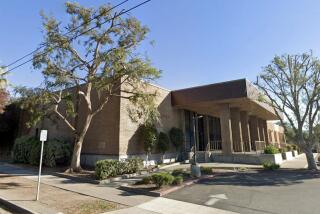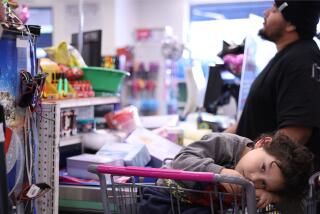Pillory’s the Price for Planters of Bad Checks in Hillcrest Store
- Share via
Posted in a Hillcrest plant store next to a bad check for $93.02:
“For those concerned, it would be much easier to reach the Dali Lama in Tibet than it would be to get in touch with Carole, who says she now lives around the corner.”
Like many merchants in San Diego, Ron Brumshagen gets worked up whenever a customer writes a bad check, because police agencies will not investigate unless the offender has a previous conviction or has bounced more than $400 in checks.
So six years ago Brumshagen created the “Bad Check Club,” a collection of returned checks with names, addresses and phone numbers prominently displayed in his plant shop on Washington Street next to bottles of Miracle-Gro and Schultz Instant liquid plant food. Next to each check, Brumshagen writes wry, nasty comments describing the frustrations of a store owner trying to collect his money.
“I’m talking about vigilance,” says Brumshagen, who opened The Basket Case in Hillcrest a decade ago. “If I can’t squeeze it out of you and embarrass you with the check club, what good is a collection agency?”
Brumshagen, 50, harshly criticizes supermarket chains and large department stores for failing to collect the money they lose to bad checks. Instead, he claims, they pass the losses on to their customers in the form of higher prices.
“We could do what they do, but we’re more vindictive,” says the animated Brumshagen in between ringing up brisk sales of poinsettias at $1.75 each. He says his business earns about a half-million dollars a year. “We operate at a lower profit margin. If I’m breaking my (butt) to give you a good deal and you still screw me, I’m going after you.”
Next to a $64.66 check written on Dec. 5, 1981: “Christmas spirit--disconnected his phone.”
With the holidays approaching, detectives at the San Diego Police Department and the San Diego County Sheriff’s Department are bracing for an annual wave of bad checks.
“We get a big influx of new check cases in the months after Christmas,” says Sgt. Joe Ramsey of the San Diego police fraud and forgery unit. “A lot of people obviously know their account has been closed or they don’t have money to cover their checks. Some claim they wrote checks because they needed food or clothing for the family. Some do it with criminal intent.”
For each returned check, law enforcement agencies require merchants to send the original check and any pertinent information on an index card within 90 days after the bank has refused payment.
Police and sheriff’s detectives will not open an investigation until they have collected more than $400 in bad checks on any one account. The limit was raised several years ago from $200--the amount that qualifies a bad check for a felony--when detectives could not keep up with heavy caseloads. The Police Department and sheriff’s office each handle about 100 bad check cases a month. The number can climb to 200 during the months after the holidays, detectives said.
Merchants are encouraged to take the thousands of customers who escape police attention to small claims court. But many businesses do not bother because of the time and expense involved in making court appearances, said Sgt. Arthur Hauer, of the sheriff’s fraud and forgery unit.
“Some merchants consider it the price of doing business,” Hauer said. “They’ll make it up. It ends up costing the public money. They’ll just add a penny or two to other items in the store.”
Next to a $15.37 bad check: “ ‘What’s My Line?’ and ‘To Tell the Truth’ are favorite television shows to many. Not excluded is Vicki . . . No one has ever heard of her. What is her real name?”
Brumshagen claims that harassing customers who write bad checks is a far more effective way to recover money than relying on police detectives or small claims court. Since he formed the Bad Check Club, Brumshagen says, the number of bad checks he receives has been cut in half, to about two per month.
“We feel there is a percentage of people who are not writing us a bad check who would normally do it,” Brumshagen says. “The wittier we are, the better job we do.”
When a customer writes a check, Brumshagen does not ask for identification such as a valid driver’s license or a credit card. All he wants is a work phone number.
“Forgery is not a problem, frankly,” Brumshagen says. “Maybe in casinos, but not in the retailing market. It’s insufficient funds.”
After he gets a returned check, Brumshagen calls the customer at work. Frequently, he tells the receptionist that the worker has written a bad check. Such messages, according to Brumshagen, work miracles in getting a quick response.
If a customer still hasn’t paid, Brumshagen contacts his employer to discuss the worker’s failure to meet financial obligations. While these conversations may further embarrass his customers, Brumshagen concedes, they rarely convince people to pay up.
“This really disappoints me,” Brumshagen says. “I call up employers and they say, ‘What do you want me to do?’ They really resent this. Theoretically, you would think they would be . . . sympathetic to a businessmen trying to make a profit.”
Customers who do not cover their bounced checks after two weeks of daily harassment become eligible for induction as new members of the Bad Check Club. Enrollment stands at 29.
Because Brumshagen has run out of room on his bulletin board, he replaces old members with new ones. Attempts by The Times to contact the members were unsuccessful. Most of the work and home phone numbers written on the bad checks were either disconnected or out of service.
Next to a $42.93 bounced check: “Arleen is on welfare, food stamps and her husband broke his leg on a drunk!”
Brumshagen says that when he informs customers that their names are about to be posted on the Bad Check Club, many of them race to his store to make amends and spare themselves the humiliation. Others have become so angry that they have torn their checks off the board.
For the most part, though, the bulletin board is an amusing conversation piece for customers waiting in line to purchase plants and wicker baskets.
“It’s become a part of the character of the store, part of the drawing card,” Brumshagen says. “But it gets frustrating. Some customers spend 15 minutes in front of the check board . . . Browsers have nothing but time to kill. It’s like having a movie for them.”
The Basket Case is not the only store in San Diego County to post bad checks. According to Sgt. Hauer, merchants who run mom-and-pop stores or neighborhood businesses gain the most from belittling customers who write bad checks. He doubts that the “Bad Check Club” would work in a supermarket.
“Usually it would be successful with . . . what we refer to as a housewife check where someone writes a check on Wednesday and hurries . . . to put money in the bank on Thursday or Friday to cover it,” Hauer said. “As far as getting results on stolen or forged checks, a crook could care less whether you post it or not.”
Next to bad checks for $21.80 and $24.80: “Marc’s mom & Marc himself say that we harassed them & are going to sue us for putting their check up on this board.”
Across the street from The Basket Case, the management at Del Mission Liquor has taped bad checks to the wall behind the cash register for the past two years. But they have resisted the temptation to follow Brumshagen by adding their own sarcastic comments.
“He’s gotta be kind of careful with defamation of character and that sort of thing,” says Joe Livolsi, manager of Del Mission Liquor.
Indeed, Brumshagen says he has received numerous threats from customers who see little humor in belonging to the Bad Check Club.
“This is defamation of character,” Brumshagen says somewhat proudly. “I definitely know it’s illegal. How much of a chance I’m taking I don’t know. If I was at the edge of losing my business, I’d still think twice about leaving it up.”
Hauer says that he has heard people who write bad checks raise legal questions about merchants who post bad checks in public.
“Of course we can’t or won’t endorse this procedure,” Hauer says. “But personally I don’t know of anything illegal about it. (The check) belongs to the store owner. If he wants to post it and let everybody know what a deadbeat somebody is, it’s up to him.”
Next to yet another bad check, this one for $69.54: “Linda is married to a doctor. Is he on welfare?”






